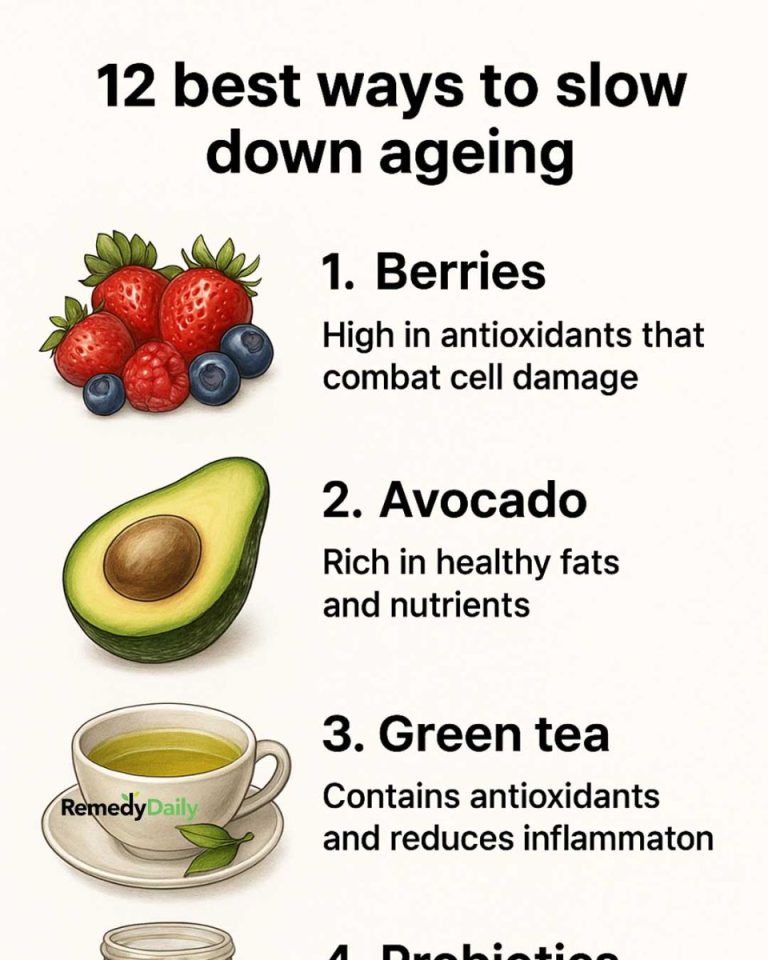ADVERTISEMENT
Aging is a natural process that everyone experiences, but many seek ways to slow it down to maintain vitality and health. While we cannot stop the clock, we can certainly influence how gracefully we age by making informed lifestyle choices. Understanding the factors that contribute to aging and how we can mitigate them is crucial in our quest to stay youthful.
In this article, we explore 12 effective strategies to slow down the aging process. From dietary changes to lifestyle adjustments, these methods are backed by science and can help you maintain a youthful appearance and robust health. Let’s delve into each of these strategies and discover how they can make a difference in your life.
1. Embrace a Balanced Diet
A balanced diet is fundamental to slowing down the aging process. Consuming a variety of nutrients ensures that your body has the necessary tools to repair and regenerate cells. Focus on incorporating plenty of fruits, vegetables, whole grains, and lean proteins into your meals. Aim for at least five servings of fruits and vegetables each day, as they are rich in vitamins, minerals, and fiber. Whole grains such as brown rice, quinoa, and oats provide essential nutrients and help maintain stable blood sugar levels.
Lean proteins, including fish, chicken, and legumes, support muscle maintenance and repair. It’s also important to limit processed foods and added sugars, which can accelerate aging by promoting inflammation and oxidative stress. By prioritizing a balanced diet, you provide your body with the nutrients it needs to function optimally and age gracefully.
2. Harness the Power of Antioxidants
Antioxidants are compounds that protect your cells from damage caused by free radicals, which are unstable molecules that contribute to aging and disease. Incorporating antioxidant-rich foods into your diet can help combat oxidative stress and support healthy aging. Foods high in antioxidants include berries, dark chocolate, nuts, and leafy greens.
For example, blueberries are packed with anthocyanins, a type of antioxidant that has been shown to improve brain function and delay cognitive decline. Dark chocolate, with at least 70% cocoa, contains flavonoids that can improve heart health and skin elasticity. Aim to include a variety of antioxidant-rich foods in your daily meals to maximize their protective benefits.
3. Stay Hydrated
Proper hydration is essential for maintaining youthful skin and overall health. Water helps to flush out toxins, keep skin plump, and support bodily functions. Aim to drink at least eight 8-ounce glasses of water per day, although individual needs may vary based on activity level and climate.
In addition to water, you can stay hydrated by consuming foods with high water content, such as cucumbers, watermelon, and oranges. Herbal teas and coconut water are also excellent hydrating options. Staying adequately hydrated can improve skin elasticity, reduce the appearance of wrinkles, and promote a healthy complexion.
4. Prioritize Regular Exercise
Regular physical activity is one of the most effective ways to slow down aging. Exercise helps maintain muscle mass, improve cardiovascular health, and enhance mental well-being. Aim for at least 150 minutes of moderate-intensity aerobic exercise, such as brisk walking or cycling, per week. Additionally, include strength training exercises at least twice a week to build and maintain muscle mass.
Exercise also boosts the production of endorphins, which can improve mood and reduce stress. It enhances blood circulation, delivering more oxygen and nutrients to your skin, which can help maintain a youthful glow. By making exercise a regular part of your routine, you can enjoy a longer, healthier life.
5. Get Adequate Sleep
Quality sleep is crucial for slowing down the aging process and maintaining overall health. During sleep, your body repairs and regenerates cells, which is essential for maintaining youthful skin and cognitive function. Aim for 7-9 hours of sleep per night to allow your body sufficient time to recover.
Establishing a regular sleep schedule, creating a relaxing bedtime routine, and optimizing your sleep environment can all contribute to better sleep quality. Avoiding screens before bed and keeping your bedroom cool and dark can also promote restful sleep. Prioritizing sleep can help reduce the appearance of fine lines and wrinkles, improve memory, and boost immune function.
ADVERTISEMENT
